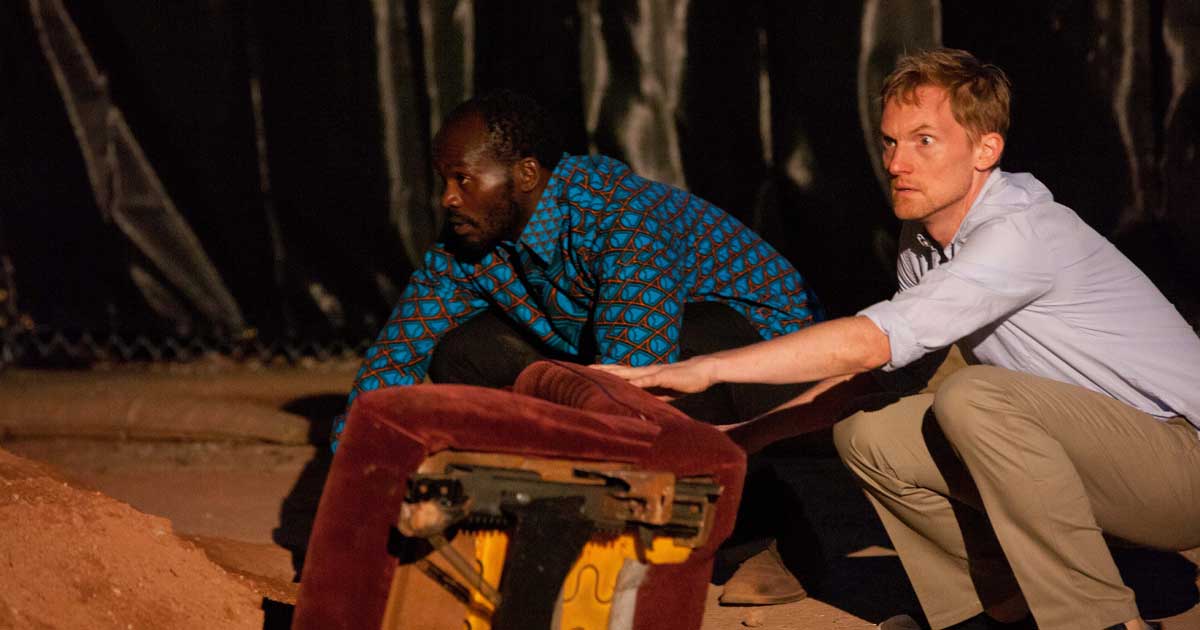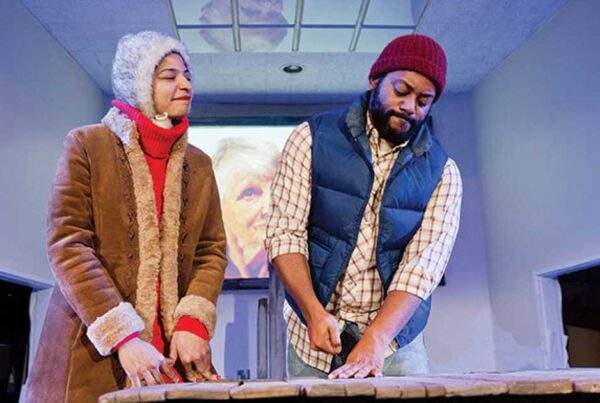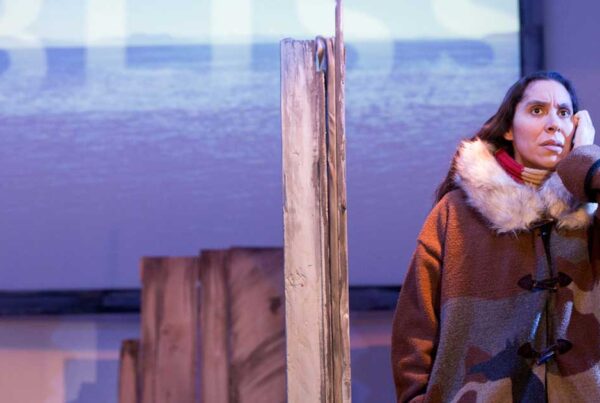
Pittsburgh Post-Gazette – Rarely do you find a work of art speak so precisely to its time as Quantum Theatre’s new production.
If you knew me, you would not have killed me.
•
I imagine Heather Heyer’s ghost whispering those words to James Alex Fields Jr., the man who ran her down with his car in Charlottesville, Va., last weekend, but those words are not hers. Nor are they the words of the ghosts of Auschwitz or Treblinka or Hiroshima.
These are the words of Sean Christopher Lewis in his new play “Red Hills,” which I saw staged Thursday night in the Strip District by Quantum Theater. Though the play was written recently and this staging was its world premiere, it concerns events of the past: the Rwanda genocide of 1994, when, according to the United Nations, “up to 1 million people perished and as many as 250,000 women were raped.”
Its two main characters are David, a professor of English at Grinnell College, and God’s Blessing, a native Rwandan. The bio for David mentions that he has been published in Zoetrope, Tin House and the Atlantic, an enviable roster of credits.
Much of the action concerns the relationship between David, who, at 23, had written a career-making book, “Red Hills,” about his experiences in Uganda and Rwanda during the genocide, and God’s Blessing, who took David and Mary, a young missionary from Ohio, on a journey through the killing fields that still haunts all three of them.
Some 15 years after the events described in his book, David lands in Rwanda and is picked up by God’s Blessing. Cultural misunderstandings ensue about whether to drink the water, where to have a cup of coffee and where David will stay. The audience sees the bumbling Westerner inadvertently offend his African host over and over again and becomes as annoyed with his politically correct righteousness as with his Whole Foods water bottle.
As the play unfolds, we learn that God’s Blessing does not like his name, preferring Charles, and that he had exposed David and Mary to life-threatening danger while himself becoming violent. In his book, David had not recounted God’s Blessing’s brutality during the genocide; he’d wanted to spare his friend’s feelings and reputation. But God’s Blessing now demands that David not only recall it, but bear witness to it.
In fact, in one of the play’s many powerful moments, God’s Blessing turns to audience members and asks them to serve as a Gacaca, a grass court. More than 12,000 of these community courts heard 1.2 million cases related to the genocide, in part to lighten the burden on international and national courts. After the murderers explained what they did, the victims had their say, then the members of the grass courts condemned those convicted to wear pink shirts so all would know of their crimes.
All Americans have witnessed what happened in Charlottesville. For anyone who might be targeted by white supremacists — myself, as a Jew, among them — August 2017 is a scary time to be living in Donald Trump’s America. Since his election, I have seen the desecration of the cemetery where my ancestors lay buried, a man urinate on a synagogue in the city where my parents grew up, and a Holocaust memorial vandalized three times in the city where my daughter goes to college.
In the ancient Jewish text “The Ethics of the Fathers,” a collection of aphorisms expressing the wisdom of the ancient rabbis, Hillel says, “In a place where there are no men, strive to be a man.” (2:6)
At a time when there is no leadership in the highest echelons of government, leadership must come from below, from the people acting as grasscourt juries.
The sharpest piece of writing I have seen on Mr. Trump this week was by “fake news” satirist Andy Borowitz of the New Yorker. It’s about Jared Kushner and Ivanka Trump confirming where they planned to take their late-summer vacation, and the dateline says it all: MORAL VACUUM.
It is terrifying to think that there are people and organizations who feel encouraged by our president to openly assemble and proclaim their hate. In response, those of good will should gather as well, to proclaim their tolerance, to include instead of exclude, to create a community of moral purpose.
Rarely does one have a sense when experiencing a work of art that it was created for just the moment of its unveiling, but last night at “Red Hills,” feeling myself a member of a grasscourt jury judging those accused of crimes against humanity, I experienced the power of such a community.
I can only hope that there will continue to be gatherings dedicated to “righteous action,” as Heather Heyer’s mother said would be the best tribute to her daughter’s memory…




